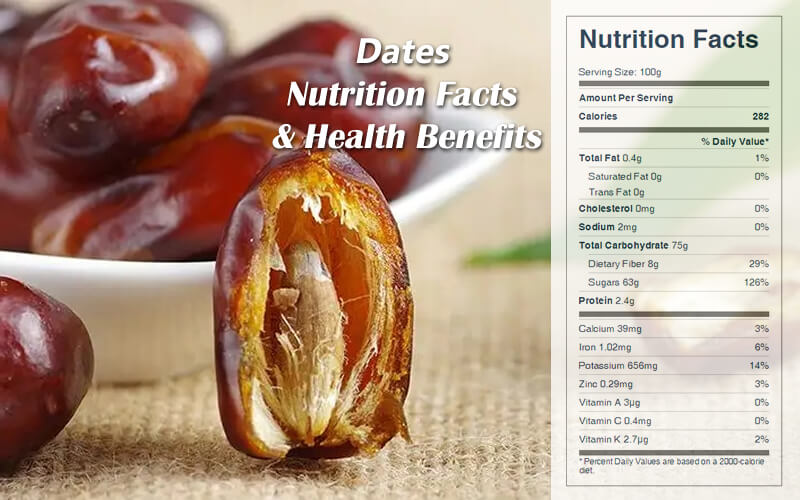Dates Nutrition Facts & Health Benefits
Dates are rich in fiber, they are mildly laxative and so prevent constipation. Dates are also a good source of antioxidants and minerals. Here are the nutritional benefits of dates.
Five dried dates with pits removed provide 114 calories, 30 g carbohydrate, 1 g protein, 0 g fat, 3 g dietary fiber, 21 IU vitamin A, 0.9 mg niacin, 5 mcg folic acid, 1 mg sodium, 270 mg potassium, 13 mg calcium, 16 mg phosphorus, and 14 mg magnesium.

Dates contain 21% water, 75% carbohydrates (63% sugars and 8% dietary fiber), 2% protein, and less than 1% fat. In a 100-gram reference amount, dates supply 282 calories of food energy and are a moderate source of pantothenic acid, vitamin B6, and the dietary minerals magnesium, manganese, and potassium.
A 2011 study found that the glycemic index for five different varieties of dates had a range of 46–55, indicating dates are a relatively low GI food source.
Dates Nutrition Facts Label
Health Benefits of Dates
Dates have a warm energy and are sweet, moist, and easy to digest.They are high in carbohydrates, glutamic acid, tyramine, niacin, boron, copper, iron, magnesium, potassium, and fiber.
A 2008 summary of research on dates showed that they are a significant source of ten minerals, including selenium, copper, potassium, and magnesium—and that 100 grams of dates would provide over 15 percent of the recommended daily allowance for them. The review also found that dates are a good source of antioxidants, primarily carotenoids and phenolics. In addition to the four minerals listed above, dates contain boron, calcium, cobalt, fluoride, iron, phosphorus, sodium, and zinc, as well as 23 types of amino acids, which is unusual for a fruit.
Dates are a highly energizing and richly nourishing food that is useful for convalescents and also an excellent addition to packed lunches.
Like most dried fruits, dates are a good source of the antioxidants that help boost the body’s defenses against some cancers.
Dates are an important source of minerals and are particularly high in potassium, helping to maintain fluid levels and the sodium/potassium balance so important in very hot climates.
Most dates contain easily available iron, but some varieties provide exceptional amounts, which may explain their historical reputation as an aphrodisiac.
Dates have strengthening, spleen-tonic, blood-tonic, energy-tonic, and laxative properties.
Dates are also recommended as a galactagogue for encouraging milk production in nursing mothers.
Dates are very sweet, with one 24-gram Medjool date providing 66 calories and almost 16 grams of sugar. They are also a great transition food for people who are trying to give up sugar and junk food.
Health Risk
People prone to migraines, obesity, diabetes, and hypoglycemia should limit their intake of dates. Be sure to brush your teeth or rinse your mouth after eating dates, as their stickiness clings to the teeth.